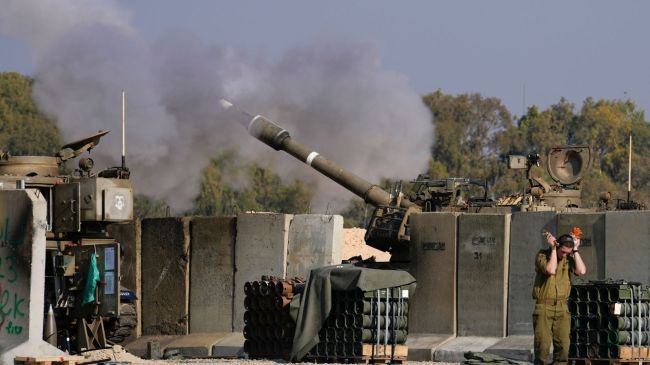Opinion C Raja Mohan writes: Can Khamenei survive Operation Rising Lion?
Each round of Israeli attacks in recent years has exposed the depth of Tel Aviv’s penetration into Iran’s establishment. The ability to target individual leaders and nuclear scientists, and even conduct operations from within Iranian territory, underscores the vulnerabilities of the regime and its ageing leader, who has held power since 1989
 Israel appears determined to roll back Iran’s nuclear and missile capabilities, ignoring global warnings that such an offensive could plunge the Middle East into a wider conflict. (Photo: AP)
Israel appears determined to roll back Iran’s nuclear and missile capabilities, ignoring global warnings that such an offensive could plunge the Middle East into a wider conflict. (Photo: AP) Israel’s unprecedented attack on Iran’s nuclear infrastructure — including its scientists, negotiators, missile bases, and military leadership — marks a dramatic escalation in the long-simmering conflict between these two sworn enemies in the Middle East, with far-reaching implications for regional stability. The irresistible force, Israel, is finally locked in a long-expected showdown with the immovable object, the Islamic Republic of Iran.
 Unlike previous military exchanges, Israel insists that Operation Rising Lion is not a one-off show of force. Declaring that Israel stands at a “decisive moment” in its history, Prime Minister Benjamin Netanyahu vowed the attacks would continue “for as many days as it takes to remove” Iran’s nuclear weapons programme, which he describes as an “existential threat” to the Jewish state.
Unlike previous military exchanges, Israel insists that Operation Rising Lion is not a one-off show of force. Declaring that Israel stands at a “decisive moment” in its history, Prime Minister Benjamin Netanyahu vowed the attacks would continue “for as many days as it takes to remove” Iran’s nuclear weapons programme, which he describes as an “existential threat” to the Jewish state.Israel appears determined to roll back Iran’s nuclear and missile capabilities, ignoring global warnings that such an offensive could plunge the Middle East into a wider conflict. This full-scale military campaign against Iran’s nuclear programme is the culmination of years of Israeli preparation.
Can Iran defend its nuclear assets and deliver a credible response to Tel Aviv?
Despite its remarkable economic and military resilience over the past five decades — and Tehran’s proven ability to retaliate against Israel — it remains uncertain whether Iran’s Supreme Leader, Ayatollah Ali Khamenei, can emerge unscathed from this latest confrontation.
Each round of Israeli attacks in recent years has exposed the depth of Tel Aviv’s penetration into Iran’s establishment. The ability to target individual leaders and nuclear scientists, and even conduct operations from within Iranian territory, underscores the vulnerabilities of the regime and its ageing leader, who has held power since 1989.
Iran also finds itself politically isolated in the region. Despite its vocal support for Arab and Islamic causes, few stood by Iran when it mattered most — last Thursday, at the International Atomic Energy Agency’s board of governors meeting.
Amid mounting speculation of imminent Israeli military action, the 35-member board voted 19-3 in favour of a resolution declaring Iran in violation of its legal obligations under the Nuclear Nonproliferation Treaty and dangerously close to acquiring nuclear weapons.
Only China, Russia, and Burkina Faso opposed the resolution, the first of its kind against Iran at the IAEA in two decades. Notably, several Arab and Muslim-majority nations, including Algeria, Bangladesh, Indonesia, Qatar, Saudi Arabia, and Turkey, did not oppose the resolution. Instead, they quickly condemned the Israeli strikes. So much for religious and ideological solidarity with Iran.
In fact, many Arab states are as concerned as Israel about Iran’s nuclear ambitions. Some would quietly welcome a successful Israeli or US rollback of Iran’s nuclear program, and several maintain significant military cooperation with Israel.
A surprising source of opposition to Israel’s campaign has emerged from the Make America Great Again (MAGA) movement, which propelled Donald Trump to power in 2024. Opposed to America’s “endless wars”, MAGA leaders have warned against being drawn into conflict with Iran by Netanyahu.
Caught between Israel’s efforts to involve the US and the MAGA movement’s pressure to keep America out of another Middle Eastern war, Washington quickly distanced itself from the Israeli strikes and warned Tehran not to target US assets in the region.
Trump praised the Israeli attacks but urged Tehran to trade its nuclear capabilities for peace and prosperity before losing even more to Israeli strikes. Netanyahu and Trump are playing a “bad cop-good cop” routine with Ayatollah Khamenei. The objective is to probe the internal cleavages in Iran’s regime. Trump referred to the killing of anti-nuclear deal leaders in Iran in the latest Israeli attacks.
Iran faces a stark choice: Escalate by attacking the US and its Arab neighbours, unleash its non-state assets in the region, risking an all-out regional war that could spell the end of the Islamic Republic, or calibrate its response through a mix of force and diplomacy. As Tehran weighs its options, Tel Aviv has made a bold gamble to neutralise Iran’s nuclear ambitions, challenge its sclerotic regime, and confront its ageing patriarch, Ali Khamenei. Israel’s hopes for a regime change in Iran are longstanding but have been difficult to realise. Could it be different this time?
The writer is distinguished fellow at the Council on Strategic and Defence Research, Delhi, and contributing editor on international affairs for The Indian Express






